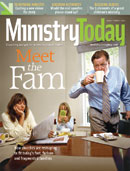Stephen Hill: Would the Real Apostles Please Stand Up?
 Stephen W. Hill, “Would the Real Apostles Please Stand Up?: The truth about apostles, authority and the kingdom of God” Ministry Today (Jan 2009), p. 68-72.
Stephen W. Hill, “Would the Real Apostles Please Stand Up?: The truth about apostles, authority and the kingdom of God” Ministry Today (Jan 2009), p. 68-72.
This rather brief article is an attempt by Stephen Hill to question the pre-eminence given to apostles in churches today. Hill begins this task by recalling for the reader a story of, what he views as dishonorable, introductory comments of a leading apostle standing as the main speaker at a recent apostolic conference. He uses this as a platform to question the contemporary understanding not only of the role of the ‘Apostle’ but also the role of all church leaders. What proceeds is a passionate argument whereby Hill insists that the abuse of apostolic authority is an issue that is at the center of a widespread misunderstanding of true leadership in God’s kingdom. The argument concludes with a proposal of a solution to this problem to be found by adopting a church structure of ‘functional ministry’ whereby there is no hierarchical leadership in place but instead each believer takes on the mutual responsibility of serving ‘one another’. This review will present the strengths and weaknesses of the key elements of Hill’s reasoning and briefly suggest how such elements could open further areas for discussion regarding church leadership.
An obvious strength of Hill’s argument is his willingness to address problematic areas of ethical leadership—an issue that seems to be of growing concern in the church today. Arguing for a re-ordering of the understanding of true leadership within God’s kingdom, Hill asserts that leadership authority should be given by invitation. Likewise, leadership should always be exercised by example in order to ensure that leaders sustain a heart of servanthood. Hill states his reason for this model is that God always desires obedience through “free conviction rather than any form of coercion” (p.69).
However, instead of developing his ideas regarding ethical leadership within the church, Hill quickly divides his focus between discussing how leaders are meant to lead and what a leader should be in the first place. Evidence for this distraction can be seen from the outset in the tone of his writing. Also, while Hill’s criticisms of an unnamed apostle and an unnamed apostolic body seem to implicate ‘apostles’ in general, we would do well to remind ourselves that this correlation is not necessarily the case.
In equating the concepts of apostleship and kingship, Hill makes the mistake of using one aspect of inappropriate leadership as justification for questioning the position of apostles, and all leaders in general, and their overall place in God’s kingdom. The resulting anachronistic ‘mixing’ of the terms and definitions for kingship and apostleship (it is not immediately obvious how these terms relate to each other to form a leadership model) leaves the reader searching for their relevance to the practicality of church leadership. Hill argues that apostleship should not be based on an Old Testament model of kingship because true theocracy is based on the authority of the priest and prophet. In other words, kingly authority is essentially a “benevolent dictatorship” that controls by coercion and oppression whereas the authority of the prophetic and priestly office is supposedly inspired by the Spirit of God. But this does not entirely agree with biblical evidence. In the Old Testament, priests had the responsibility of teaching God’s law (Lev 10:11, Mal 2:6-7), yet in the book of Hosea we find a situation where the more the priests increased, the more sin increased among the community. As a result, God blamed the priests for the people’s lack of faithfulness (Hosea 4:7). Likewise, even though kingship is an example of an ungodly use of leadership authority (as argued by Hill) we find that David’s main purpose as Israel’s king was to shepherd God’s people (Psalms 78:70-72). If the importance of this notion of kingship in the establishment of God’s Kingdom was ever in doubt, one may find that the Davidic covenant (established in 2 Samuel 7) is of utmost importance in the prophetic foretelling of the coming of the Messiah as the ultimate fulfillment of a King who will be the ultimate Shepherd over His people. Furthermore, while Hill seems to disproportionately favor a New Testament perspective over an Old Testament one in determining the proper characteristics of godly leadership (p.71-72), he would do well to note that a number of dishonorable characteristics can be found among the leadership of the early church, which proves His argument to be inconsistent (Acts 15:36-41; Galatians 2:11-14; 2 Timothy 4:10, 16; Philemon 1:14, 17-21). Hill’s logic, therefore, is scripturally imbalanced.
Category: Ministry, Summer 2009


